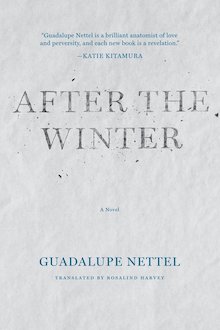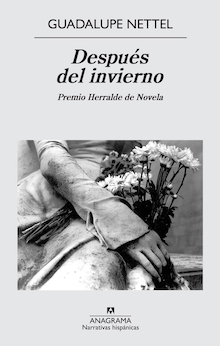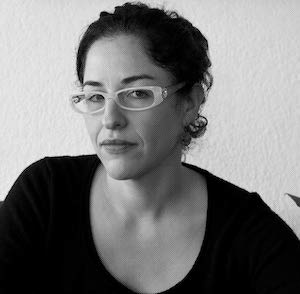After the Winter [Why This Book Should Win]
Check in daily for new Why This Book Should Win posts covering all thirty-five titles longlisted for the 2019 Best Translated Book Awards.
Rebecca Hussey is a community college English professor, a book reviewer, and a Book Riot contributor, where she writes a monthly round-up of indie press books, including many books in translation. You can find her on Twitter at @ofbooksandbikes.

After the Winter by Guadalupe Nettel, translated from the Spanish by Rosalind Harvey (Mexico, Coffee House Press)
After the Winter’s first chapter introduces us to one of the most unlikeable, unpleasant characters I have ever come across. Claudio is a young man living on the Upper West Side of Manhattan who says things like, “All living things inspire in me an inexplicable horror, just as some people feel when they come across a nest of spiders.” Here’s how he describes his girlfriend: “Ruth is as careful and as obstinate as a reptile, capable of vanishing whenever my boot is about to squash her into the ground.” That Claudio has a girlfriend at all is obviously a miracle, but we quickly come to realize that we are seeing him in a way no other person does: to many of the characters, he can present himself as a relatively normal person, but with us, his readers, he is being honest, and we see that he is not “normal” at all.
 This is what makes After the Winter so utterly compelling: the characterization is rich and fearless. Claudio has a strong sense of who he is, but he is not always correct in his assessments: when his best friend (a friend he sees only very occasionally) hears that he has a girlfriend: “‘Poor woman,’ he said at last, in a low voice. ‘What terrible thing can she have done to deserve you?'” The levels of meaning are exquisite: we see what friendship means to Claudio (not much), we get a glimpse of the darkness Claudio’s best friend sees in him, and we see Claudio skip from what should be an utterly devastating put-down straight to a memory of having sex with Ruth. That this memory makes him feel sick for reasons he tells us he doesn’t understand is enough to make the reader feel queasy in turn.
This is what makes After the Winter so utterly compelling: the characterization is rich and fearless. Claudio has a strong sense of who he is, but he is not always correct in his assessments: when his best friend (a friend he sees only very occasionally) hears that he has a girlfriend: “‘Poor woman,’ he said at last, in a low voice. ‘What terrible thing can she have done to deserve you?'” The levels of meaning are exquisite: we see what friendship means to Claudio (not much), we get a glimpse of the darkness Claudio’s best friend sees in him, and we see Claudio skip from what should be an utterly devastating put-down straight to a memory of having sex with Ruth. That this memory makes him feel sick for reasons he tells us he doesn’t understand is enough to make the reader feel queasy in turn.
This is not a man any of us would want to meet, and yet Nettel makes us stay in his mind for pages upon pages. Claudio is Nettel’s utterly miraculous and completely horrible creation; fortunately for the reader, the novel switches back and forth between Claudio and its second main character, Cecilia. She won me over with the melancholy of her first sentence: “At different periods in my life, graves have protected me.” She grew up in Oaxaca, abandoned by her mother and raised by her father and grandmother, until she wins a scholarship to study in Paris.
She is quiet, bookish, and troubled. She quickly makes a good friend in Paris and spends most of her first summer partying, but when she settles into a place of her own and starts her studies, she falls into a depression. She says things like “I was of the opinion that intelligent people, those with the necessary valor for facing up to reality, could do nothing but go through life with a heavy heart.” She spends a lot of time gazing out her window at a nearby cemetery: “I tried to explain that I did not find graves upsetting. I preferred my neighbors to be inordinately quiet rather than the opposite.” Her candor is disarming, and Nettel makes us feel her every emotion. When she falls in love with her neighbor, Tom, we rejoice, and when she finds out he is very ill, we mourn. When she eventually meets Claudio, we get very, very worried.
 What Nettel makes of these two stories is what makes this book worthy of winning the Best Translated Book Award—that and her vivid prose, beautifully translated by Rosalind Harvey. The stories contrast and echo each other in fascinating ways. Both characters have left their homes—Claudio from Cuba and Cecilia from Mexico—and develop vexed relationships with their home countries and their new cities. They are both loners, looking out at the world with wary detachment. They define themselves through their books and reading. Both stories are in first person and explore the characters’ self-awareness, or lack thereof. They describe themselves with a calm self-confidence that is easy to begin to trust, but in each case, cracks in their self-presentation appear.
What Nettel makes of these two stories is what makes this book worthy of winning the Best Translated Book Award—that and her vivid prose, beautifully translated by Rosalind Harvey. The stories contrast and echo each other in fascinating ways. Both characters have left their homes—Claudio from Cuba and Cecilia from Mexico—and develop vexed relationships with their home countries and their new cities. They are both loners, looking out at the world with wary detachment. They define themselves through their books and reading. Both stories are in first person and explore the characters’ self-awareness, or lack thereof. They describe themselves with a calm self-confidence that is easy to begin to trust, but in each case, cracks in their self-presentation appear.
But how can Cecilia be at all similar to the terrible Claudio? She is and she isn’t, and watching how the two characters develop and what happens when they meet is a revelation. I won’t give away the ending, but I found it surprising and satisfying. Guadalupe Nettel is a writer to trust: she will take you into the mind’s dark places, illuminate them brilliantly, and bring you out again feeling like you have been somewhere important.

Leave a Reply